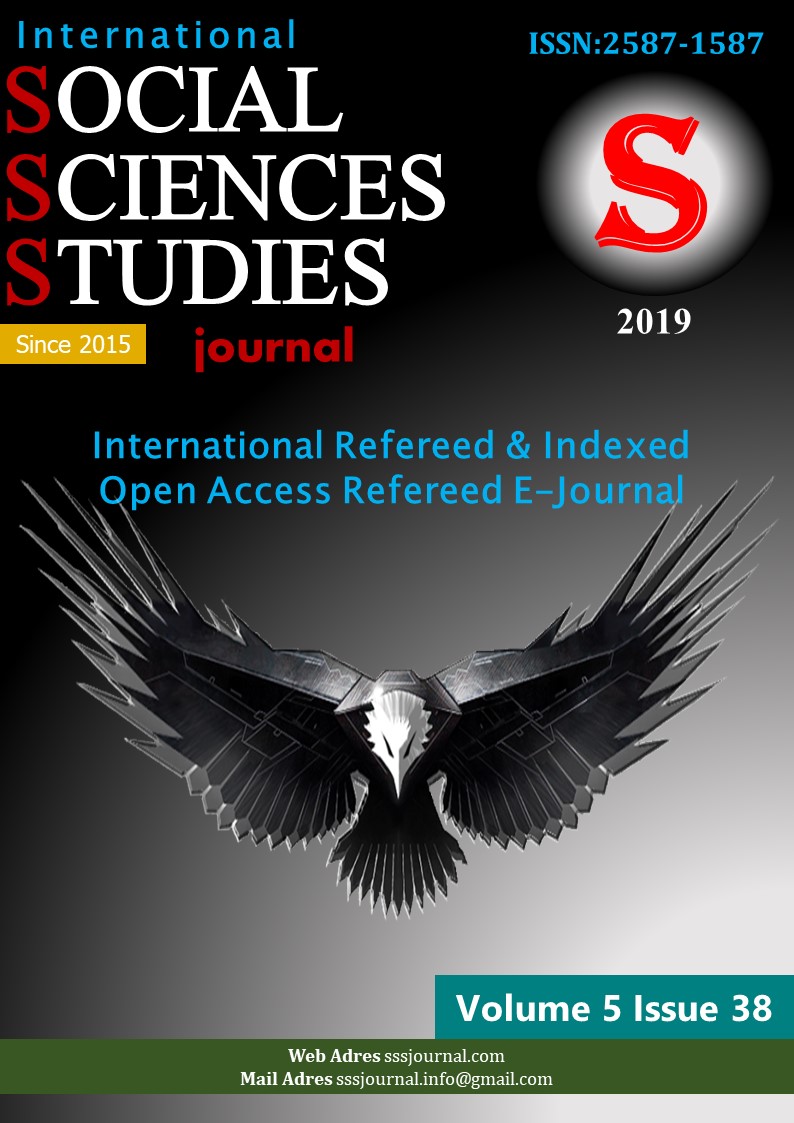Author :
Abstract
XIX. yüzyılın başlarından itibaren Avrupa’da artan anti-semitizim sonrasında Filistin topraklarında Yahudiler için bir devlet kurulması fikri bazı Yahudi çevrelerce kabul edilmiştir. Bu sebeple Osmanlı idaresinde bulunan Filistin’e yönelen Yahudi göçleri Yahudi nüfusu artırmıştır. I. Dünya savaşı sonrası Filistin’de kurulan manda rejimi yönetim haklarını BM’ye devrederek çekilen İngiltere’nin yerinde İsrail devlet olarak kurulmuştur. Günümüze değin meydana gelen olaylar karşısında Filistin’de yaşayan edebiyatçıların işgale karşı kaleme aldıkları eserler bu edebi türün konusunu oluşturmaktadır. Direniş Edebiyatında şiir, hikâye, roman, gazete ve dergi makaleleri kaleme alınmıştır. Edebi alanda verilen mücadelede kalemin etkisinin silahın etkisinden daha fazla olduğu görülmüştür. Silah sadece bir cephede etki gösterirken, edebi eserler halkın her cephesinde etkisini göstermiştir. Filistin Direniş Edebiyatı Filistinli halkın yaşadığı sürgünleri ve zorlukları tüm dünyaya anlatma vazifesini üstlenmiştir. Yazarlar bunu yaparken kelimelere taşıyabilecekleri kadar anlam yüklemenin önemini kavramış ve kalemi bir silah gibi kullanmışlardır. Ruh hallerini yansıtırken kelimeler kifayetsiz kalınca semboller kullanarak duygularını okuyucuya ifade edebilmişlerdir. Filistin Direniş Edebiyatı gerek şekil gerekse anlam yönüyle Modern Arap Edebiyatına tam uyum sağlamıştır. Bu edebi tür Filistin topraklarında hem Filistin’de yaşananları dışarıya anlatma, hem de Arap dünyasında gelişen olayları Filistin halkına anlatma şeklinde iki yönlü bir bilgi akışına hizmet etmiştir.
Keywords
Abstract
Since the beginning of 19. centuries in the Europe growing anti-semitism in the Palestinian territories, aftermath of the idea of establishing a state for Jews has been accepted in some Jewish circles. For this reason, the Jewish population in the Ottoman administration increased depending on the Jewish immigration towards Palestine. After the world War 2, the administrative rights taken by the UN in Palestine, in place of the regime of UK Israel was established. Until today the events that occurred in the face of writers who lived in Palestine against the occupation of artifacts and achieved goals is the subject of artifacts. In the literature of resistance poetry, stories, novels, newspapers and magazines has been written. Thus, Literature has shown that worrier pens are more effective than weapons. While a gun has a unidirectional effect, literary works reached and penetrated a wide audience. The literature of Palestinian resistance has assumed the responsibility of explaining for Palestinian people's suffering and difficulties to the whole world. When authors do that, attributed meaning to the words as much as they can carry and they sentimentalized about this. They turned their pens to guns. They expressed the feelings to readers by using symbols when they realized that words were not enough. The literature of Palestinian resistance is compatible with every aspect and it ensured full compliance to modern Arabic literature. This literary genre is serving for a two-way flow of information: Firstly, it aims that telling 'what happened in Palestine' to others and notify them. Secondly, telling the new events in the Arab world to the Palestinian people.
Keywords
- (Erişim:29/01/2019), https://blogs.aljazeera.net/blogs/2018/7/22/%D8 %BA%D8%B3%D8%A7%D9%86-%D9%83%D9%86%D9%81%D8 %A7%D9%86%D9%8A-%D8%B1%D8%A7%D8%A6%D8%AF-
- Avde Nebil, Şi‘r el-Mukâveme Beyne’l-Mazmûn es-Siyâsi ve’l-Mazmûn el-Edebî, (Erişim: 27/01/2019): http://www.m.ahewar.org/s.asp?aid=544271&r=0
- Baktıaya Adil, “1830: Fransa’nın Cezayir’i İşgali, Abdülkadir’in Yükselişi ve Amerikan Kamuoyunda ‘Abdülkadir’ Hayranlığı”, Ortadoğu Etütleri, Ocak 2010, Cilt 2, Sayı 2, 143-169.
- Basit Musa İsmail, vd. (Hamza Zib Mustafa, Gassan Musa Muhibiş ve Said Süleyman Kik), Kudüs Tarihi, Nida Yayıncılık, İstanbul 2011.
- Bezirâvî Basil Muhammed Ali, Dirâsetu’n-Nakdiyye fi Kasâid el-Mahzûfe, (Basılmamış Yüksek Lisans Tezi), Câmiatu Necah el-Vataniyye, Külliyyetu’t-Dirâsetu’l-Ulyâ, Filistin 2008.
- Can Muhammet Berat, Semih el-Kasım’ın Hayatı, Eserleri ve Mukavemet Edebiyatındaki Yeri, Basılmamış Doktora Tezi, Erzurum 2019.
- Cankara Pınar Özden, Türkiye’de Sağ Muhafazakâr İslamcılık Akımının Filistin Sorununa Yaklaşımı, (Yayımlanmamış Doktora Tezi), İstanbul Üniversitesi S. B. E. , İstanbul 2013.
- Doğan Mehmet, Doğan Büyük Türkçe Sözlük, Vadi Yayınları, Ankara 2003, 941.
- el-Ferâhidî Halil bin Ahmet, Kitab’u’l-Ayn I-IV, Dâr’u’l-Kütüb el-İlmiyye, Beyrut 2003, III/s. 445. 50 Semih el-Kâsım, İnnehâ Mücerradü Minfezatün, 87; en-Nakkâş, 252.
- 51 Nebil Avde, Şi‘r el-Mukâveme Beyne’l-Mazmûn es-Siyâsi ve’l-Mazmûn el-Edebî, (Erişim: 27/01/2019): 52 Han Muhsin Atik, Gassan Kenefânî; Râid Dirâsetü’l-Edebü’l-Mukâvim ve’l-Edebu’s-Sahyûnî, (Erişim:29/01/2019),
- https://blogs.aljazeera.net/blogs/2018/7/22/%D8 %BA%D8%B3%D8%A7%D9%86-%D9%83%D9%86%D9%81%D8 %A7%D9%86%D9%8A-%D8%B1%D8%A7%D8%A6%D8%AF-%D8%AF% D8%B1%D8%A7%D8%B3%D8%A9-%D8%A7%D9%84%D8%A3%D8% AF%D8%A8- %D8%A7%D9%84%D9%85%D9%82%D8%A7%D9% 88%D9%85-%D9%88%D8%A7%D9%84%D8%A3%D8%AF%D8%A8-
- el-Hadrâ el-Ceyyûsî Selma, el-itticâhât ve’l-Harakât fi’ş-Şi‘ri’l-Arabîyyi’l-Hadîs, (Arapçaya Çev. Abdü’l- Vahid el-Lü’lüe), Beyrut 2007, 101-103.
- el-Kâsım Semih, el-A’mâl el-Kâmile I-VI, Dâr Suâd Sabbâh, Kahire 1993, I, 9.
- el-Kâsım Semih, İnnehâ Mücerradü Minfezatün, Dâr Râyetün li’n-Neşr, Hayfa 2011. en-Nakkâş Recâ, Şa‘ir el-Arz el-Muhtelle
- ̧Dâru’l-Hilâl, Kahire 2011, 54-72.Er Rahmi, Çağdaş Arap Edebiyatı Seçkisi, Vadi Yayınları, Ankara 2012, 13.
- eş-Şaddiy Fevziyye, “Semih el-Kâsım: Sîretün Zâtiyyetün ve İbdâi’yyetün”, Divân el-Arab, 2014, 1-11. (Erişim:13/02/2018), www.diwanalarab.com/spip.php?article40244.
- Hamza Hüseyin, “en-Nihâye fi Kasîdeti’l-Mukâveme” el-Mücemma’, 4(3), 2010, 44.
- Han Muhsin Atik, Gassan Kenefânî; Râid Dirâsetü’l-Edebü’l-Mukâvim ve’l-Edebu’s-Sahyûnî,(Erişim:29/01/2019) https://blogs.aljazeera.net/blogs/2018/7/22/%D8%BA%D8%B3%D8%A7%D9%86- %D9%83%D9%86%D9%81%D8%A7%D9%86%D9%8A-%D8%B1%D8%A7%D8%A6%D8%AF-
- Kamel Riad, “Sûratu’l-Âmil fi’ş-Şi‘r Zeyyâd ve’l-Kasım”, (Erişim: 27.03.2019), http://m.ahewar.org/s.asp?aid=627099
- Karaman M Lütfullah, “Siyonizm”, DİA, TDV Yayınları, İstanbul 2009, XXXVII, 329-335.
- Kasalak Kadir, “İngilizlerin Filistin Politikası ve Filistin Mandası”, Süleyman Demirel Üniversitesi S. B. E. Dergisi, 2016 3 (25), 74.
- Kenefâni Gassân, el-Edeb’u’l-Filistînî el-Mukâvim Tahte’l-İhtilâl 1948-1966, Dâr Menşûrât el-Rimâl, Kıbrıs 2013.
- Kenefânî Gassân, el-Edeb’u’l-Filistînî el-Mukâvim Tahte’l-İhtilâl 1948-1968, Müessesetü’d-Dirâsât’ü’l- Filistiniyye, Beyrut 1968.
- McCarthy Justin, The Population of Palestine: Population Statistics of the Late Ottoman Period and the Mandate, Columbia University Press, New York 1998, 19-20.
- Müsa‘ade Adnan, “Hayatuhû” Kitap Te’bîni eş-Şâ‘ir’u’l-Kebîr Semih el-Kâsım, Câmiatu’n-Necâh el- Vataniyye, Nablus, Filistin 2014, 10
- Mim Kemal Öke, Siyonizm ve Filistin Sorunu (1880-1923), Timaş, İstanbul 2018.
- Sâlim Naci Muhammed, el-Bu’d’ el-Kavmî fi Şi‘r Semih el-Kâsım, (Basılmamış Yüksek Lisans Tezi), Câmiatu’l-Ezher, Külliyyetu’l-Edeb ve’l-‘Ulûm el-İnsâniyye, Gazze 2018.
- Yazıcı Hüseyin, “Mehcer Edebiyatı”, DİA, Ankara 2003, XXVIII, 365 (364-367).





